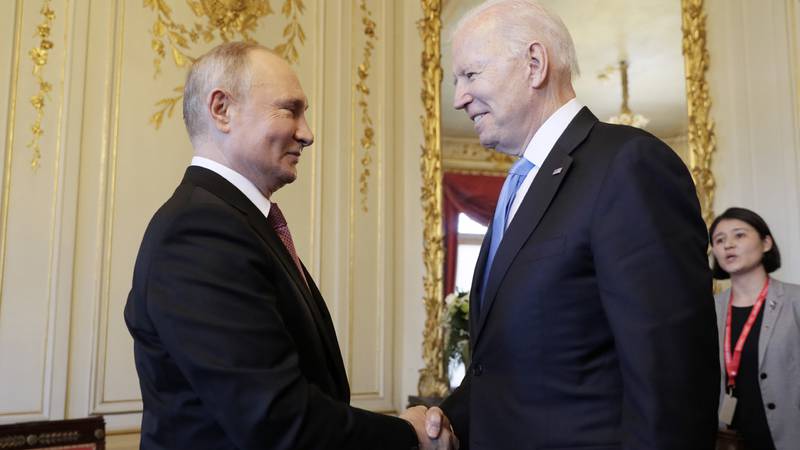Joe Biden and Vladimir Putin spent a little less than four hours in conversation without hysteria, exaggerated accusations or frenzied policy defences – in short, normal, scripted summit.
Predictable diplomacy – telling your negotiating partner what you think without appearing aggressive or giving too much away – the sort everyone expected before the advent of Donald Trump.
UKRAINE, GEORGIA UNLIKELY TO BE PLEASED
Ex-Soviet Ukraine and Georgia – both dealing with the occupation of large tracts of territory by Russia or its proxies – likely came away disappointed if they had expected the summit to bring clarity to their strategic issues.
With plenty of issues to divide them – Moscow’s alleged cyber attacks, a military buildup near Ukraine in April or the largely theoretical right of assembly in the Russian heartland — the leaders agreed on predictable things, like putting their ambassadors back in place and pledging to breathe new life into disarmament.
Accounts in the Ukrainian media of the two leaders’ separate post-summit news conferences revealed that little time was spent discussing its affairs – even NATO membership, which President Volodymyr Zelensky now sees as the sole means of solving Ukraine’s problems of having 7 percent of its territory held by armed Russian proxies.
RED LINES
Putin has long insisted that any notion of Ukraine – or Georgia – joining the Atlantic alliance is a “red line” not to be crossed.
“We looked at the issue of Ukrainian membership of NATO at a glance,” the nv.ua website quoted Putin as saying in Geneva. “But I think there is nothing to discuss here.”
BELARUS SCANDAL A SUB-TOPIC
Belarus also warranted a brief mention – The United States has denounced, and Putin has tacitly supported—Belarusian President Alexander Lukashenko’s brutal crackdown on his opponents and the detention of an independent journalist arrested after his scheduled flight was diverted to Minsk airport.
“He didn’t agree with me,” the Belarusian opposition site Nexta quoted Biden as saying. “He asked: ‘What can we do about it?’”
There were many points of disagreement during the discussions – notably human rights and allegations of cyberattacks.
Biden said it was a normal moral stand to challenge Putin on human rights, particularly the restrictions on the freedom to demonstrate and the fate in prison of opposition figure Alexei Navalny.
“It’s not about just going after Russia when they violate human rights. It’s about who we are. How could I be the president of the United States of America and not speak out against the violation of human rights?” he said.
Restricting freedoms in Russia, like the right to free speech and assembly, Biden said, “diminishes their standing in the world” and if Navalny were to die in prison, “the consequences of that would be devastating for Russia”.
Putin retorted with finger-pointing, saying Russia wanted none of the unrest associated with the “Black Lives Matter” movement or the U.S. Capitol’s violent storming in January by Trump supporters trying to overturn the election result. The protesters, he said, had merely made “political demands”.
ELECTION INTERFERENCE
Biden said the United States wanted to rule out any notion of election interference – as an intelligence report earlier this year had established that Russian operatives had meddled in the 2016 election won by Trump. Putin said Russia did not engage in such activities – an area in which he said Washington excelled. Biden said Washington had “significant cyber-capabilities, and he (Putin) knows it”.
This division was in stark contrast to Trump’s seeming deference to Putin’s statement at their 2018 summit in Helsinki that Moscow had done no such thing – against the advice of his own Intelligence agencies. That sent some of Trump’s own staff reeling in disbelief.
SOME UNDERSTANDING ON FUNDAMENTAL ISSUES – NUCLEAR AND CYBER
But there were matters subject to agreement at the meeting.
Putin said the two sides had agreed that their ambassadors – brought home several months ago – could return to their posts.
He also said the two sides would also begin “consultations” on cyber-related issues.
There will also be talks between the U.S. State Department and the Russian Foreign Ministry on a range of disarmament issues, including the New Start strategic nuclear missile treaty. Moscow had been aggrieved at the Trump administration’s withdrawal from the ABM treaty of 1970s vintage and its reluctance to extend New Start.
BACK TO PROTOCOL NORMS?
Both presidents gave a vague sort of backing to setting established norms of behaviour in a wide range of political and diplomatic activity.
“We must agree on rules of behaviour in all the spheres that we mentioned today: That’s strategic stability, that’s cybersecurity, that’s resolving questions connected to regional conflicts,” Putin said. “I think that we can find agreement on all this — at least I got that sense given the results of our meeting with President Biden.”
Biden coined the term “guardrails” to be set up to ensure stability in the Washington-Moscow relationship.
And the atmospherics were undoubtedly good.
“I think that the last thing he wants now is a Cold War,” Biden said of Putin. “I truly believe he thinks that. He understands that.”
“There has been no hostility,” Putin said. “On the contrary, our meeting took place in a constructive spirit.”
So where did the outcome leave those other ex-Soviet states hoping talks with Biden would produce concessions of some sort from the Kremlin?
Ukraine, anticipating the outcome, said it would not be bound by any agreement that might be reached in talks or in a backroom.
“We have made it very clear to our partners that no agreement on Ukraine reached without Ukraine will be recognised by us,” Foreign Minister Dmytro Kuleba said ahead of the meeting.

